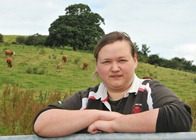Healthier beef from fatter grass

PhD student Sarah Morgan
24 July 2012
Scientists at the Institute of Biological, Environmental and Rural Sciences (IBERS) have begun research in co-operation with Celtic Pride Ltd into identifying and understanding the variation in fat content and fatty acid composition of grass, along with assessing the current impact of a forage-based production system on fat composition of beef.
Fat is a vital macronutrient within the human diet and is essential to sustain life. Yet humans are not consuming adequate amounts of beneficial fats such as omega-3 polyunsaturated fatty acids, hence we need to examine ways in which we can remedy this. One route to increasing beneficial fats in the diet is forage-fed beef, since grass contains a high amount of beneficial omega-3 fatty acid.
Celtic Pride has become one of Wales' most recognised beef brands and Celtic Pride Beef carries the coveted Protected Geographical Indication (PGI) status, awarded to food products that have full traceability within their country of origin.
Sarah Morgan is a sheep farmer’s daughter from Llanddeusant and ‘fell in love with Animal Science’ whilst studying for her degree at IBERS, Aberystwyth University. Now a PhD student funded through the Knowledge Economy Skills Scholarships (KESS) scheme, she will be spending three years working closely with Celtic Pride and said:
“Grass is a very important resource to farmers which is cheap, natural and sustainable. Cattle fed on grass-based diets produce beef with higher levels of beneficial unsaturated fatty acids compared to concentrate-fed cattle. This is because the main fatty acid in grass is an essential omega-3 polyunsaturated fatty acid.”
Professor Nigel Scollan, Waitrose Chair of Food and Farming at IBERS said:
“Working on this project extends our existing partnership with Celtic Pride, and delivers a practical outlook and application of this currently novel research towards better understanding of fat control and variation in grass. Our ambition is to create protocols for the production of grass fed beef with improved fat composition. The project will also deliver academic, economic and societal impacts such as knowledge advancement, commercialisation opportunities and health benefits.”
Tim Rowe of Celtic Pride said:
“This is an exciting collaboration and having the IBERS team and Sarah in particular working with us will enable Celtic Pride to continue to demonstrate the commitment of our farmer-producer group and commercial partners Wynnstay and Castell Howell Foods in producing a product that not only ticks all of the right boxes in terms of best practice in sustainable farming, but also is working to produce a finished product that the end consumer will recognise as being not only a product of high quality but one with the added dimension of contributing to a healthier diet.”
AU25012



